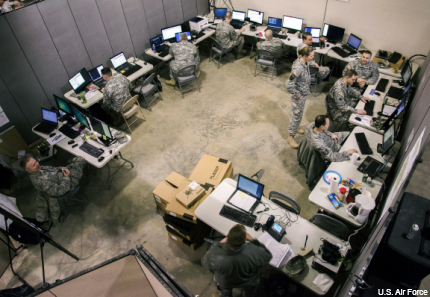'Hackfest' puts cadets into virtual hand-to-hand combat
After a month-long training course at the Air Force Institute of Technology, Air Force and Army Reserve cadets put their skills to the test against each other.

Cadets in the Advanced Cyber Education program take part in a capture the flag exercise.
As the Pentagon looks to lean more heavily on the Reserves to help fill out its cyber force, cyber training for cadets is taking more of a real-world approach. Air Force and Army Reserve cadets at the Advanced Cyber Education program hosted at the Air Force Institute of Technology, for example, recently concluded their training courses by going to battle with each other in a competitive “hackfest.”
The hackfest, according to a program leader, is a test of everything students learned during the month-long ACE program that concluded earlier this month.
The competition attempts to force participants to “think outside the box” while building their own enterprise networks – complete with email, Web, file transfer and file sharing servers – and trying to crack passwords and vulnerabilities of opposing teams. According to a release by the Air Force Research Lab, the objective of the hackfest was to break into opposing teams’ machines, find flags and plant friendly flags while maintaining functional control. Such virtual “capture the flag” games have become commonplace as cyber training tools; the Army held one last month at Fort Meade.
“It’s the closest thing we have to cyber warfare or hand-to-hand cyber combat in our environment,” Dr. Timothy Lacey, a program leader, said in a video report from Wright-Patterson Air Force Base. “Some of the boxes, more than one student is in that box at the same time and so they’re fighting with each other inside the computer for control of that box.”
The ACE program – designed for Academy and Reserve Officer Training Corps cadets who are studying computer science, computer engineering and electrical engineering – works to develop the next generation of cyber leaders. Topics and issues students learn within the cybersecurity disciplines include:
- Formal security concepts
- Computer network defense
- Cyber attack
- Digital forensics
- Reverse software engineering
- Cryptography.
“Coming to the program, it’s pretty amazing what skilled hackers are able to do to our infrastructure and system.” said Cadet William Cowden, an Army ROTC student participant. “And if they’re malicious hackers, they can do serious damage, which is why programs like this are so important.”
NEXT STORY: Navy, Army teams to take home GCN Awards




